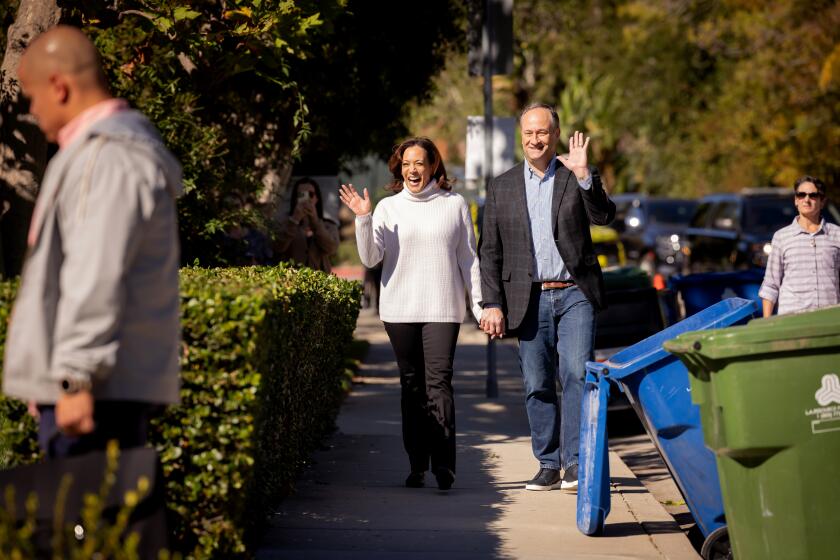The Conventional Life : What’s in a Delegate’s Day? Hurried Meals, Crowded Hotels, Endless Details and Talk Into the Night
It’s peculiar that any American living in Paris would voluntarily flee France to work 21-hour days at a political convention, chairing an obscure delegation known as Democrats Abroad--8 1/2 Dukakis delegates and one-half a Jackson delegate from Europe, Israel, Hong Kong, Central America and Japan.
But conventioneering is in Dean Ferrier’s blood.
“My grandmother died of a stroke while she was packing her bag to go to the Republican state convention,” said Ferrier, who recalls giving political speeches to schoolchildren when she was 15. Her mother also had the activist affliction, hauling homemade lemonade to People’s Park in Berkeley to quench the thirst of the 1960s demonstrators.
When she was growing up, idealism and wanderlust pulled at Ferrier--then Dean Poole--with equal force. After attending Cal State Los Angeles, she decided Southern California had a “phony, superficial, Hollywood atmosphere,” so off she went to Europe to study at the London School of Economics and the Sorbonne.
But now, at age 52, Ferrier finds she has never lost her fascination for American politics. She may be married to a French lawyer and may have lived for 13 years in Paris, but she is still a citizen of her native land, pays U.S. taxes and is “an American to the marrow of my bones.”
Girding for Conventioneering
And so it was that she came to Atlanta for the Democratic National Convention, where at 6 a.m. the 5-foot-1 delegate was pressing an ice pack to her eye bags, trying to make her tired face look presentable for a day’s conventioneering.
To outsiders, the modern political convention may seem nothing more than an overblown social gathering, the quadrennial opportunity for Wisconsinites to wear cheese on their heads.
But to many of the delegates, most of whom pay their own way to get there, the event is both a fun and a serious matter, a precious chance to participate in the political process. It offers a forum to exchange ideas, plot strategies and lobby politicians.
To follow a day in the life of a conventioneer like Ferrier, you must start not with the 6 a.m. ice packs but much earlier, just past midnight, when Ferrier is on her hotel room phone ringing the Dukakis camp, wanting to know where she can get copies of the proposed minority platform planks to be debated on the convention floor the next day. Her delegation would be meeting at 8:30 that morning to familiarize themselves with the planks.
As the rest of her delegation slumbered or celebrated, Ferrier set out in the steamy night to pick up the position papers at 1 a.m. at another hotel.
“I got them myself because they were too slow,” said Ferrier.
She returned to her hotel and prepared for the next morning’s meeting until 3 a.m., then fell into her usual version of sleep, leaping out of bed now and then to scribble notes.
A call from her husband had her up and about by 6. The phone kept ringing as the overseas Americans at the convention called to seek her help with their every problem.
“I have no children. These are my children,” said Ferrier, whose early morning duties included securing a pass for a Democrat from Hong Kong. “I made him a page,” she said, explaining how she would get the delegate into the convention hall.
Ferrier had many more people to look after other than just the nine voting delegates who represent about 3,000 Americans who voted in the overseas primary; 50 Americans from abroad, sleeping three and four to a room, attended the convention to be part of the action and to touch base with other people and things American. More than a dozen of them went to an Atlanta Braves baseball game to get a fix of America’s national pastime.
The morning meeting was in a tiny hotel room with a wall-unit air conditioner that dispensed noise but no coolness. The 30 seats were filled with coffee-gulping, jet-lagged conventioneers ready to discuss the proposed minority planks and other issues.
As Americans, they pay U.S. income tax and have a host of special problems, like obtaining Medicare benefits at their foreign residences, difficult access to absentee ballots, the passing of citizenship to foreign-born offspring, and, for some, anti-American terrorist activities on their doorsteps.
The group discussed Medicare, pending legislation and how to write to members of Congress in their home states. They were asked if they had inadvertently signed a Lyndon LaRouche petition, which his supporters sought to use to get his name placed in nomination. No one said they had. Ferrier encouraged them to attend workshops on fund-raising and other subjects, and she told delegates how to respond if approached by the press.
“I’m going to get to that reporter who said this is just a partying delegation and not interested in issues,” she barked to the group.
Despite her best efforts, delegation co-chair Richard Kostner, an English professor at a branch of Florida State University in Panama, minutes later was joking with a reporter that he was “the only potent male at the ’64 Atlantic City convention” who did not chase the young hostesses giving out soft drinks to delegates.
He said he was at his seventh convention “because it’s fun. I’m a masochist. I love these things.”
Kostner had, indeed, been more serious at the morning meeting, where emotions often bubbled over. Discussing the minority platform plank that would have stated the party’s intention to raise taxes for “the very rich,” everyone seemed to have an opinion.
Jean Patterson from Costa Rica had the difficult task of embodying the “half” Jackson delegate and having to defend minority planks proposed by Jackson, though she conceded she was just talking off the top of her head.
“I think it’s time for rich people to do their turn,” Patterson said gamely.
“This uses weasel words,” another delegate retorted. “What does ‘very rich’ mean?”
“Remember Mondale?” chirped another, recalling Mondale’s 1984 campaign pledge to raise taxes.
“(Former candidate Bruce) Babbitt talked about taxes and he was the first one out,” somebody said.
“And he was the smart one,” another chimed in. “So much for brains.”
The next plank, promising no first use of nuclear weapons, had Patterson, again, on the defensive.
“I believe in no first use but it’s (political) suicide to bring it up,” one woman began.
Patterson responded: “I’m a peace woman and I’d be pleased to have no first use. I don’t think we should pussyfoot about it.”
‘This Would Lose Votes’
“I was a conscientious objector 25 years ago, but I’m also a Democrat and I say this would lose votes,” a delegate from Israel said.
“I ask you to consider what Bush will say about this,” another delegate said. “He’ll say, ‘There go those tax-raising, soft-on-defense Democrats.’ ”
A woman in the back supported Patterson’s view.
“We need to have political courage sometime. I hate to see this blanket thrown over everything of ‘Don’t say it, we won’t win.’ ”
The discussion over a plank that seemed to endorse a Palestinian homeland grew heated--an argument ensued over the word establish and what it meant--so much so that one woman interjected, “I think it’s important that we don’t say, ‘That’s stupid thinking.’ ”
Asking for Consensus
Instantly the noise level rose another notch. Ferrier cooled things by reminding them, “Is it understood there won’t be a floor vote on this?”
One of the most hotly contested questions was when to hold the next meeting. A delegate moved to meet at 10 the next morning. Then a substitute motion for 8 a.m. was offered and voted on first. Delegates hoped to meet early so they could have time to attend workshops.
The motion for the 8 a.m. meeting was tested in a voice vote, and after only two or three voices uttered, “Nay,” Kostner declared, “The nays have it!”
Groans of protest and laughs brought another substitute motion, this one for a show of hands on a 7:59 a.m. meeting. As Kostner counted the “ayes,” he spotted a pal and said: “We were out until 5 a.m. drinking. If the SOB is going to drink with me, he ought to vote with me. We adjourn until 7:59 a.m. tomorrow, you idiots!”
Gulping, Coordinating, Rushing
After the meeting, Ferrier ate her first food of the day, half a muffin. She gave press interviews and sent someone to pick up yet more credentials. Then, with the volunteer driver assigned to her by the convention host committee, Ferrier headed over to the convention site to attend a meeting of delegation chairs and to scout out places where her delegation could eat for free.
Spotting Peter Alegi from Rome, she offered him a pass for free food. He replied, “I might even buy some food. The moths will come out of my wallet when I open it.”
At 4:45 p.m., Ferrier quickly ate her first meal of the day, a Creole shrimp dish. She rushed to the convention, where proceedings had begun, and found her delegation “in a panic” because they couldn’t figure out how to use the computerized voting machines. She showed them how.
She passed out VIP lounge food passes, then dealt with “a real catastrophe.” A delegation member had signed the LaRouche petition after being given misleading information about it; she now wanted to retract her signature, though she had not mentioned this at the earlier meeting.
A Hasty Phone Call
Ferrier hastily called the Democratic National Committee from her floor phone. They sent someone with forms for the woman to sign. But when the national committee worker arrived, the delegate had vanished; Ferrier dispatched others to find her.
The LaRouche matter was resolved just in time for the next crisis. During debate on the Palestinian plank, members of the Abroad delegation from Israel walked the floor with protest signs, angering some other delegation members. Ferrier persuaded everyone to calm down.
Then a delegate came to her with a conscience problem. He was committed to Dukakis but wanted to change to Jackson. Ferrier told him she thought that would be a “token show of support,” and it would be more meaningful to join Jackson’s campaign activities to help elect Dukakis.
“He was so pleased,” Ferrier said, “because I gave him a constructive way to vote his conscience. That was a tough one. It took half an hour.”
Tears, and a Party
During Jackson’s speech, Ferrier and the woman sitting next to her had only one tissue between them; they had to wipe away tears with their hands.
When Jackson’s speech ended around midnight, Ferrier was too keyed up to sleep, so she went with another delegate to a party for state chairs given by Democratic National Committee treasurer Sharon Pratt Dixon.
The event was at a Georgia mansion that had been converted into a restaurant. There, Ferrier sat beside the swimming pool and listened to the Ramsey Lewis Trio.
But even as the jazz swirled around her, another thought buzzed through her weary mind: That 7:59 a.m. meeting--it was just hours away.
More to Read
Get the L.A. Times Politics newsletter
Deeply reported insights into legislation, politics and policy from Sacramento, Washington and beyond. In your inbox three times per week.
You may occasionally receive promotional content from the Los Angeles Times.










